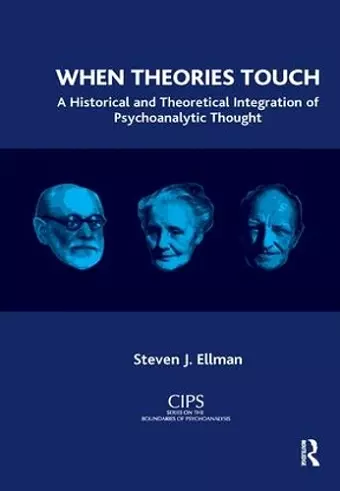When Theories Touch
A Historical and Theoretical Integration of Psychoanalytic Thought
Format:Paperback
Publisher:Taylor & Francis Ltd
Published:31st Dec '10
Currently unavailable, and unfortunately no date known when it will be back
This paperback is available in another edition too:
- Hardback£135.00(9780367329730)

This book aims to deconstruct the different theoretical perspectives of psychoanalysis, and reconstruct these concepts in a language that is readily understood. Wherever possible this is meant not to do away with terms that are meaningful, but to attempt to clarify terms and concepts.The book comes in three sections. The first examines Freud's different theories and describes how Freud shifted his emphasis over time. The second section covers all the major post-Freudian theorists: Hartmann and Anna Freud (together in one chapter), Melanie Klein, Fairbairn, Winnicott, Sullivan, Mahler, Kohut, Kernberg, and Bion; and a chapter on the movement from classical theory to contemporary conflict theory. The last section deals with issues raised in contemporary psychoanalysis - issues as they pertain to the clinical situation, and the rationale for a theory of endogenous stimulation.
Although various analysts have written about an era of convergence, to some extent one might consider that psychoanalysis has entered into a time that is best thought of as similar to the era of the tower of Babel. There is however a difference; in the Old Testament God created many languages and there was confusion. In the new testament of psychoanalysis, we use the same language and there is confusion. In the present volume it is the author's desire to help deconstruct (literally) the tower, and reconstruct (literally) concepts in psychoanalysis that will be placed in a language that hopefully is readily understood. 'The distinguished psychoanalyst Steve Ellman outlines - in an illuminating and original way - the development of psychoanalytic thought from Freud to the most contemporary theories and debates. The controversy between those who maintain that the interpretation of conflicts is the crucial healing factor in psychoanalysis and proponents of the relational critique of Freudian clinical theory is overtly faced towards the end of the volume and an highly original and integrative model is offered. This book is not only a rich tribute to the history of ideas but also a great enhancement for analysts to talk to each other across the boundaries of the models in psychoanalysis. This volume is as precious as the Rosetta Stone which has allowed different languages to communicate.'- Antonino Ferro, author of The Bi-Personal Field: Experiences in Child Analysis and Seeds of Illness, Seeds of Recovery: The Genesis of Suffering and the Role of Psychoanalysis'Dr Ellman has a remarkable ability to dwell within the psychic reality of each of the great theorists he discusses, and to make it feel as if each one were explaining his or her theory to you personally. This allows the reader to know them in a deeper way and to experience them in their historical context. Perhaps the most important aspect of the volume are the chapters on contemporary theory and Ellman's own view of where we are going. This book is an amazing tour de force that anyone who learns, teaches or uses psychoanalytic theory will need to own.'- Sheldon Bach, PhD, author of Getting from Here to There: Analytic Love, Analytic Process and The Language of Perversion and The Language of Love'Dr Ellman has written an elegant book that will be experienced as a number of different books. This volume is both a text book of psychoanalytic theories and an integrative evolving theory in its own right. As a text book it outlines the essential Freudian hypotheses as well as the contributions of all significant post-Freudian analysts. As an evolving integration Ellman focuses on what he experiences as valuable in each position. The result is Ellman's own creative synthesis. This book should be read by all colleagues who value the relationship between theoretical and clinical conceptualizations. It advances our clinical understanding as well as our theoretical foundation.'- Arnold Rothstein, MD, author of Psychoanalytic Technique and the Creation of Analytic Patients and Models of the Mind: Their Relationships to Clinical Work
ISBN: 9781855758681
Dimensions: unknown
Weight: unknown
736 pages